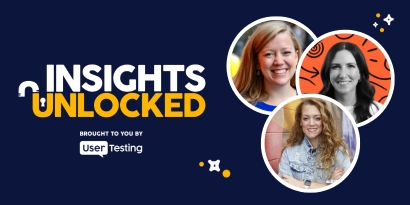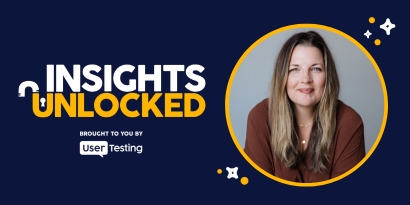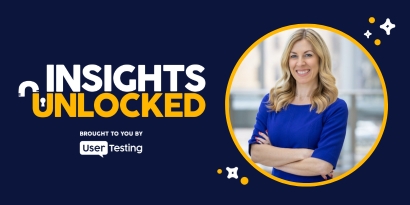
Episode 26 | December 20, 2021
Customer centricity and CRM with Brent Leary
CRM expert Brent Leary shares how customer centricity, trust, and data transparency drive better digital experiences and lasting customer relationships.
Beyond the transaction: How customer centricity and CRM drive trust in the digital age
In an age where every click leaves a digital footprint, companies face a pressing question: how do you build meaningful customer relationships when everything is tracked—and trust is on the line?
In a recent episode of Insights Unlocked, UserTesting’s Janelle Estes sat down with Brent Leary, a CRM industry analyst and long-time observer of customer relationship trends, to unpack how CRM, customer centricity, and digital transformation intersect in today’s experience-driven world. Their candid conversation reveals why putting people at the heart of data strategies is no longer a nice-to-have—it’s business-critical.
Rethinking customer centricity: It’s not just a buzzword
Customer centricity has become a well-worn phrase, but Leary challenges companies to go deeper. “A customer-centric organization is one who really looks beyond the transaction,” he explains. “You don’t just value the customer for the $29.99 a month they pay. You value their input, their feedback, and you use that to improve what you offer”.
It’s a philosophy that’s tightly woven into the success of modern businesses—especially as customer behavior evolves faster than ever. With digital transformation reshaping how we interact with brands, companies must move beyond data collection for sales purposes and into using that data to understand, empathize, and engage in real ways.
“A customer-centric organization is the one who really looks beyond the transaction.” — Brent Leary
ON-DEMAND WEBINAR
Tactical (and practical) tips to get fast feedback for better marketing
In this webinar you’ll:
- Learn strategies for getting efficient feedback on copy, language, and messaging
- Optimize your practice around connecting with your customers' moods, needs, and experiences as the business environment changes
- Take away best practices on understanding how rich media such as video and audio is resonating
CRM: More than just a database
Customer relationship management (CRM) has often been misunderstood as just a tool for storing contact details. But as Leary describes it, CRM is a foundation for any customer-first strategy.
“CRM started out as basically a place to hold data,” Leary reflects. “But now, it’s a foundational piece to the strategy of engaging customers beyond the transaction”.
Today’s CRM systems are evolving into dynamic platforms that allow businesses to:
- Analyze customer behavior across touchpoints
- Listen to feedback in real time
- Tailor offerings based on actual customer needs
- Enhance trust through transparency
Used thoughtfully, CRM can help companies move from reactive to proactive—building experiences that resonate rather than simply respond.
“CRM is a good place to manage your data, but the real work comes in creating products and experiences that are the right thing to do.” — Brent Leary
The trust equation: Privacy, transparency, and empathy
Trust is currency in today’s digital landscape, and companies are spending it fast.
Leary points to the growing tension between customer data tracking and brand trust. “The more digital your interactions are, the more trackable they are,” he notes. “And that raises questions—who has my data? How are they using it? How long do they keep it?”
Many companies start with good intentions, aiming to improve customer experience through personalization. But as they uncover new ways to monetize user data, the risk of overreach increases.
This is where transparency becomes a competitive differentiator.
“Consumers know there’s no free lunch,” says Leary. “But companies haven’t been forthright about how they’re using data. That’s where the trust breaks down.”
How to rebuild trust:
- Clearly communicate what data is collected and why
- Share how it benefits both the customer and the business
- Give users control over their data and privacy settings
- Avoid vague or overly altruistic messaging—be real
“It’s better to be open and say, ‘Yeah, we all benefit,’ than to pretend it’s all for the customer.” — Brent Leary
Real human connections in a digital world
While digital transformation has made interactions more efficient, it hasn’t necessarily made them more human.
Leary emphasizes the importance of actual conversations—not just behavior tracking or sentiment analysis. “Good customer-centric companies are good listeners,” he says. “They go beyond selling. They ask: What are you trying to do? How can we help you improve your life?”
Companies that actively listen to their customers—through feedback loops, interviews, and continuous discovery—unlock a deeper understanding of what matters. This empathy fuels innovation and drives creativity in product development and service delivery.
And it pays off. Leary shared a personal story about a company that provided exceptional real-time support late on a Saturday night. “That one interaction made me a customer for life. Not because of the tech, but because of the human behind it,” he said.
The post-pandemic shift: From efficiency to empathy
Pre-pandemic digital transformation was often about doing the same things faster and cheaper. But the global shutdown forced companies to reconsider not just how they operate—but why.
“We used to think digital transformation was about efficiency,” Leary says. “Now, we see it’s about resilience and creativity. It’s about building new ways to connect, not just translating the old ones”.
That shift is opening the door to deeper, more authentic relationships with customers—if companies are willing to walk through it.
Scaling empathy and customer understanding
One of the biggest challenges today is scaling the kind of empathy that used to happen face-to-face. Small businesses and digital natives often do this well, says Leary, because they start with the customer in mind.
But as companies grow, there’s a temptation to automate empathy—to replace conversations with dashboards.
“You can't scale relationships with code alone,” Leary warns. “You have to show you care. Be responsive. Be available. Be human”.
“Technology is only as good as the people who use it—and the mindset they bring to it.” — Brent Leary
Looking ahead: A data-rich, trust-poor future?
As wearables, smart devices, and AI-driven platforms proliferate, the volume of customer data will explode. Leary warns this future could deepen the existing trust gap if not handled with care.
“All that data is going into the hands of people who haven’t been transparent about how they use our current data,” he says. “That’s a problem. And customers are starting to push back”.
He predicts legislation will eventually catch up—but in the meantime, it’s up to companies to self-regulate with ethics and empathy at the forefront.
Key takeaways for customer-first leaders
To build a truly customer-centric business in today’s digital world, remember to:
- Use CRM as a foundation, not just a repository
- Prioritize transparency in how you collect and use data
- Actively listen to your customers—through data and direct feedback
- Lead with empathy, not efficiency
- Create experiences that benefit both the customer and the business
- Scale human interactions with thoughtful, responsive service
In Brent Leary’s words, the path forward isn’t just about better tech—it’s about better relationships.
“Technology has given us the power to reach more people, but it hasn’t made us better at building relationships. That’s still on us.” — Brent Leary
Episode links
- Why your organization needs a customer-centric approach: This blog post explores the importance of adopting a customer-centric strategy, emphasizing how understanding and prioritizing customer needs can drive business success.
- The importance of customer centricity: This webinar delves into how a user-centered design approach can bridge the gap between customer expectations and designer confidence, highlighting strategies to align organizations around the customer.









